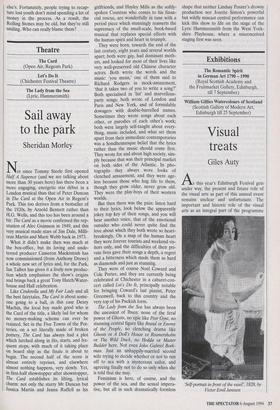Theatre
The Card (Open Air, Regents Park) Let's Do It (Chichester Festival Theatre) The Lady from the Sea (Lyric, Hammersmith)
Sail away to the park
Sheridan Morley
Nat since Tommy Steele first opened Half A Sixpence (and we are talking about more than 30 years here) has there been a more engaging, energetic star debut in a London musical than that of Peter Duncan in The Card at the Open Air in Regent's Park. This too derives from a bestseller of the 1920s, by Arnold Bennett rather than H.G. Wells, and this too has been around a bit: The Card as a movie confirmed the rep- utation of Alec Guinness in 1949, and this very musical made stars of Jim Dale, Milli- cent Martin and Marti Webb back in 1973.
What it didn't make then was much at the box-office, but its loving and unde- terred producer Cameron Mackintosh has now commissioned (from Anthony Drewe) a whole new set of lyrics and, for the Park, Ian Talbot has given it a lively new produc- tion which emphasises the show's origins and brings back a great Tony Hatch/Water- house and Hall celebration.
Like Cinderella and My Fair Lady and all the best fairytales, The Card is about some- one going to a ball, in this case Denry Machin, the local boy made good who is the Card of the title, a likely lad for whom no money-making scheme can ever be resisted. Set in the Five Towns of the Pot- • teries, on a set literally made of broken pottery, The Card has always had a plot which lurched along in fits, starts, and fre- quent stops, with much of it taking place on board ship as the finale is about to begin. The second half of the score is almost entirely reprises, and elsewhere almost nothing happens, very slowly. Yet, in first-half showstopper after showstopper, The Card establishes its lilting, lyrical charm: not only the starry Mr Duncan but Jessica Martin and Jenna Ruffell as his girlfriends, and Hayley Mills as the softly- spoken Countess who comes to his finan- cial rescue, are wonderfully in tune with a period piece which stunningly reasserts the supremacy of the small-scale, book-based musical that replaces special effects with the human spirit and heart in triumph.
They were born, towards the end of the last century, eight years and several worlds apart; both were gay, had dominant moth- ers, and looked for most of their lives like very well-preserved old Chinese character actors. Both wrote the words and the music: 'you mean,' one of them said to Richard Rodgers in mock-amazement, `that it takes two of you to write a song?' Both specialised in 'list' and marvellous- party songs; both wrote of London and Paris and New York, and of formidable dowagers with double-barrelled names. Sometimes they wrote songs about each other, or parodies of each other's work; both were largely self-taught about every- thing, music included, and what set them apart from their immediate contemporaries was a Sondheimesque belief that the lyrics rather than the music should come first. They wrote for and about high society, sim- ply because that was their principal market on both sides of the Atlantic. In pho- tographs they always wore looks of clenched amazement, and they were age- less because those who hug life to them, though they grow older, never grow old. They were the play-boys of their western worlds.
But then there was the pain: listen hard to their lyrics, look below the apparently jokey top key of their songs, and you will hear another voice, that of the emotional outsider who could never quite find the love about which they both wrote so heart- breakingly. On a map of the human heart they were forever tourists and weekend vis- itors only, and the difficulties of their pri- vate lives gave their songs a depth, a regret and a bitterness which made them as hard as diamonds and just as stunning.
They were of course Noel Coward and Cole Porter, and they are currently being celebrated at Chichester in a cabaret-con- cert called Let's Do It, principally notable for bringing Coward's last pianist, Peter Greenwell, back to this country and the very top of his Puckish form.
The Lady from the Sea has always been the uneasiest of Ibsen: none of the feral power of Ghosts, no epic like Peer Gynt, no stunning central figure like Brand or Enemy of the People, no clenching drama like Ghosts or A Doll's House or Rosmersholm or The lVild Duck, no Hedda or Master Builder here. Not even John Gabriel Bork- man. Just an unhappily-married second wife trying to decide whether or not to run off to sea with a mysterious sailor, and agreeing finally not to do so only when she is told that she may.
Feminism is here, of course, and the power of the sea, and the sexual impera- tive, but all in such dramatically formless shape that neither Lindsay Posner's drowsy production nor Josette Simon's powerful but wildly miscast central performance can kick this show to life on the stage of the Lyric Hammersmith from the West York- shire Playhouse, where a misconceived staging first was seen.


















































 Previous page
Previous page